
Полная версия
The Hero’s Guide to Saving Your Kingdom
“I don’t mind,” said Ella. “I was dirty and unkempt for years. I was always covered in soot and cinders from cleaning the fireplace, so at least I see where he got the name from.”
“Speaking of names,” said Frederic, “have you noticed that the song refers to me as ‘Prince Charming’? My real name’s not in there at all. People are going to think I’m the same prince from that Sleeping Beauty song or the Rapunzel one. Here, listen and tell me what you think.” He called out to a passing servant, “Excuse me, my good man. Could you please fetch Pennyfeather the Mellifluous for us? Tell him that the prince and Lady Ella would like a command performance of ‘The Tale of Cinderella.’”
“I’m sorry, milord,” the servant replied. “Mr. Pennyfeather is unavailable. He hasn’t been seen for days, actually. It’s the talk of the palace; we assumed you would have heard by now. No one knows where the royal bard is.”
“Well, that explains why I haven’t been getting my lullaby these past few nights,” Frederic said thoughtfully.
“Frederic, maybe something awful has happened to Pennyfeather,” Ella said, sounding a bit too excited by the prospect. “We should check into it. Come on, let’s go. We need to figure out the last person to see him. Let’s start by asking at the gate—”
“Oh, I’m sure it’s nothing so dramatic,” Frederic said quickly. The only thing he had a harder time imagining than a crime occurring within the royal palace was himself investigating such a crime. “He’s probably just off at a bard convention somewhere, one of those gatherings where they vote on the precise number of feathers a minstrel should have in his cap—that sort of thing. But don’t worry, just because Pennyfeather himself isn’t here doesn’t mean we can’t have music. I’ll just send for—”
“Never mind the song, Frederic,” Ella said, taking a deep breath. “Remember how we were just talking about my sheltered childhood?”
Frederic nodded.
“Now that I’m free, I want to have new experiences. I want to find out what I’m capable of. So, if we’re not going to look into Pennyfeather’s disappearance, what can we do today?” she asked. “What kind of adventure can we have?”
“Adventure, right.” Frederic pondered his options briefly. “It is a lovely day. Nice and sunny. I’m thinking picnic.”
Ella slumped. “Frederic, I need to do something different.”
Frederic stared at her like a lost baby rabbit.
“I hear there’s a troupe of traveling acrobats in town,” Ella suggested. “Maybe we could get them in here to teach us some tumbling.”
“Oh, but I’ve got that problem with my ankle.” He had no problem with his ankle.
“How about a treasure hunt?” Ella proposed excitedly. “Some of the kitchen staff were gossiping about a bag of stolen gold that one of your father’s old valets hid in the tunnels below the castle. We could try to find it.”
“Oh, but I can’t go below ground level. You know what dampness does to my sinuses.” Dampness did nothing to his sinuses.
“Can we go boating on the lake?”
“I can’t swim.” This was true.
Ella huffed. “Frederic, what can we do? I’m sorry if this sounds rude, but I’m bored.”
“We could have a different kind of picnic,” Frederic offered hopefully. “We could do breakfast food for lunch. Croissants, poached eggs. How’s that for shaking things up?”
Ella walked back to her horse and hopped up into the saddle. “Go ahead and order your picnic, Frederic,” she said flatly. “I’m going to ride a bit more while you wait.”
“Okay,” Frederic said, and waved to her. “I’ll stay right here.”
“I’m sure you will. You’re very good at that,” Ella replied. And she rode off.
An hour or so later, Frederic sat out on the palace lawn (well, on a carefully unfolded blanket, actually—he didn’t want to get grass stains on his white pants), waiting for his lunch and his fiancée to arrive. A servant arrived and set down a tray of breakfast delicacies in front of Frederic. “Milord,” the man said, as he bowed and backed away. “There’s a message there for you.”
Frederic saw a folded piece of paper nestled between a bowl of grapefruit slices and a plate of chocolate-chip waffles. He picked up the note, with a sudden sinking feeling about what it might say.

Frederic dropped the letter onto his empty plate. So, he thought, the ball was the most romantic night of her life, huh? Well, that’s not saying much coming from a girl whose typical nights consisted of scraping dead spiders out of cracks in the floorboards. And look how she signed it. “All the best”? That’s how you sign a thank-you note to your dog walker. Frederic had completely lost his appetite.
“Reginald!”
“Am I really that boring?”
Frederic was back in his room, sitting slumped on the edge of his cashmere-covered bed, while Reginald, rigid as ever, stood next to him, awkwardly patting the prince’s head.
“There, there, milord,” the valet answered. “I don’t think the Countess of Bellsworth would call you boring. Do you remember how elated she was when you taught her how to cha-cha? You have many, many admirers, sir.”
“Yes,” Frederic said sorrowfully. “But Ella is apparently not among them.”
“It seems that Lady Ella simply seeks a different kind of life than that which you can provide for her here at the palace,” Reginald said.
“Poached eggs! How stupid can I be?” Frederic smacked himself on the forehead.
“There will be other women, milord.”
“I don’t want any other women. I want Ella. Reginald, what do you think I should do? And be honest with me; don’t just tell me what you think my father would want you to say.”
Reginald considered this request. He’d been caring for Frederic since the prince was a child. And he’d never been more proud of Frederic than when he saw the young man stand up to his overbearing father. Frederic could use someone as feisty and fearless as Ella in his life.
“Don’t let her get away,” Reginald said, dropping his overly stiff posture and speaking in an unusually casual tone.
“Wow,” Frederic gasped. “Did you just get two inches shorter?”
“Never mind me,” Reginald said. “Did you hear what I told you? Get a move on! Go after Ella.”
“But how?” Frederic asked, still bewildered to hear his longtime valet speaking like a regular person.
“We’ll put you on a horse. Charles can show you the basics. You don’t need to be the world’s best rider; you just need to be able to get around. Stick to the roads and you’ll be fine.”
“But—”
“I know you’re scared, Frederic. But here’s my advice: Get over it. Ella wants someone as adventurous as she is. A real hero.”
“Then I’ve got no hope.” Frederic sulked. “I’m a fantastic dresser. My penmanship is top-notch. I’m really good at being a prince, but I’m pretty lousy at being a hero.”
Reginald looked him in the eye. “There’s a bit of courage in you somewhere. Find it. Go catch up with Ella, wherever she is. And just see what happens. She might be impressed enough that you’ve left the palace.”
“There’s no way my father will allow me to do this.”
“We won’t tell him.”
“He’ll notice I’m gone eventually. And when he does, he’ll send his men to retrieve me.”
“Whichever way you go, I’ll send them in the opposite direction.”
“I’m still not sure I should. It’s really dangerous out there.”
“That’s your father talking,” Reginald said. “Look, if you go on this journey, you’re not just doing it for Ella, you’re also doing it for that little boy who once wanted to try everything.”
“You mean my cousin Laurence, who broke his leg trying to fly with those wax wings?”
Reginald looked at him soberly. “Frederic, you don’t really remember your mother, but I do. And I know what she’d want you to do.”
Frederic stood up. “Okay, I’ll go.”
“That’s the spirit,” said Reginald.
Frederic marched out of his room. A second later, he marched back in.
“I should probably change into something more appropriate for the outdoors,” he said.
Reginald put his arm around him. “You don’t own anything more appropriate for the outdoors,” he said with a smile. “Come, let’s get you down to the stables.”
The next morning, after several hours of secret, intensive riding lessons, Prince Frederic trotted out through the palace gates on horseback, with Reginald and Charles the groom waving him good-bye. His eyes were tightly closed, his arms wrapped around the horse’s neck. Then something dawned on him.
“Wait,” he called back to Reginald. “I don’t know where I’m going.”
“Ella’s note said she was going to find that Rapunzel girl,” Reginald said. “Those bards are never very good about telling you exactly where their stories take place. But based on the clunky rhymes, I’m pretty sure ‘The Song of Rapunzel’ is the work of Lyrical Leif, the bard from Sturmhagen. Humph. With a name like Lyrical Leif, you’d think the guy could come up with better lines than, ‘Her hair was real long, not short like a prawn.’ Anyway, I’d try Sturmhagen. Head south.”
“But Sturmhagen? Isn’t it supposed to be full of monsters?” Frederic said, his eyes growing wider by the second.
“Ride fast,” Charles the groom called out. “With any luck, you’ll catch up to Lady Ella before you reach the border.”
“I can’t ride fast,” Frederic said. “I’m trying hard to make sure I ride forward.”
“Then so far you’re succeeding,” Reginald yelled. “Stay strong!”
Frederic gripped his horse tighter, wondering what in the world he’d gotten himself into. Within twenty-four hours, he would be sniffling through a rainstorm, wishing he’d never left home. In a little over a week, he’d be quivering in the shadow of a raging giant. Another week after that, he would end up at the Stumpy Boarhound. But for now, he was on his way to Sturmhagen.

Sturmhagen wasn’t a big tourist destination, mainly because of all the monsters. The kingdom’s thick and shadowy pine forests were crawling with all sorts of horrid creatures. And yet, that fact never seemed to bother the people who lived there. For most Sturmhageners, the occasional troll attack or goblin raid was just another nuisance to be dealt with, on par with a mouse in the pantry or a ferret in the sock drawer. These are tough folks we’re talking about. Take the royal family, for instance: King Olaf, at age sixty, was seven feet tall and capable of uprooting trees with his bare hands. His wife, Queen Berthilda, was only two inches shorter, and once famously punched out a swindler who tried to sell her some bogus “magic beans.”
Prince Gustav, who stood six-foot-five and had shoulders broad enough to get stuck in most doorways, was nonetheless the smallest member of his family. Growing up as the “tiny” one among sixteen older brothers, Gustav felt a desperate need to appear bigger and more imposing. This usually involved puffing out his chest and speaking very loudly: Picture a six-year-old boy standing on top of the dining room table, posing like a statue of a war hero, and shouting, “The mighty Gustav demands his milk cup be refilled!” This didn’t make him look impressive—it made him look strange. His older siblings mocked him mercilessly.
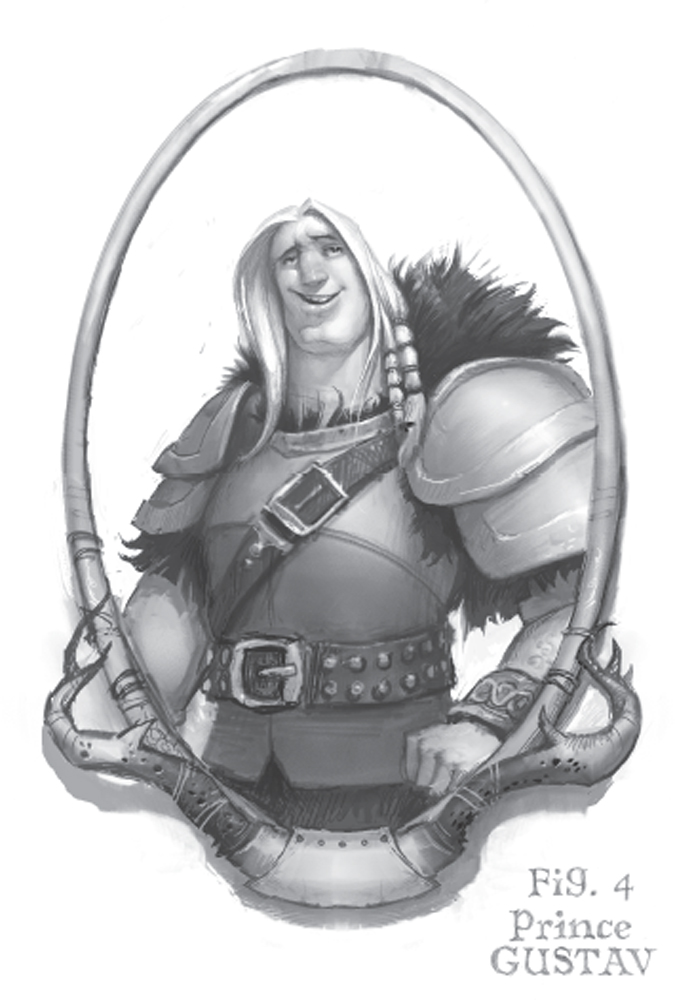
The more people laughed at him, the more distraught Gustav became. He stuffed balls of yarn into his sleeves to make his muscles look larger (and sadly, lumpier). He tied bricks to the bottom of his boots to make himself taller (and clomped around like a sumo wrestler in a full-body cast). He even grew his hair long, just so he would have more of something. Unsurprisingly, his brothers continued to tease him.
In his later teen years, Gustav became a frustrated, angry loner. For as much of the day as possible, he avoided contact with other people (which was not necessarily a bad thing for the other people). He would roam on horseback through the pine forests of Sturmhagen, hoping to find some creature he could fight—and thereby prove his strength and heroism. One day he stumbled upon something incredible.
There was a tall tower standing all by itself in a forest clearing. Oddly, it had no doors and no stairs. But it did have a girl stuck up in a room at the very top—a girl with eighty feet of hair. She lowered her shimmery blond locks down to Gustav, and he used them as a rope and climbed up to her. Once inside the small tower room, Gustav learned that the girl’s name was Rapunzel and that she was the captive of an evil witch.
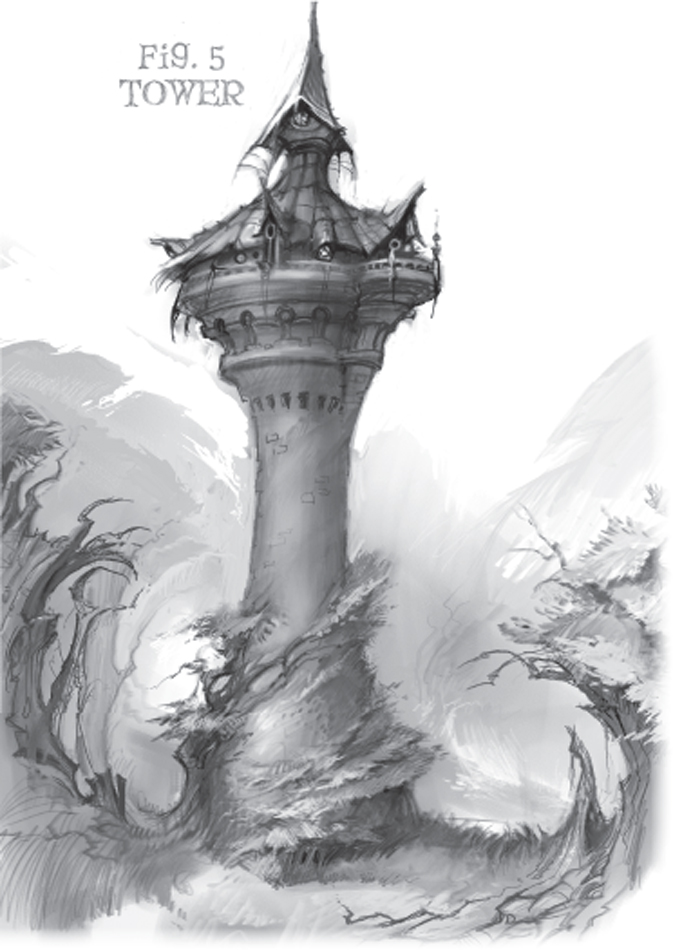
Now, Gustav was not exactly a ladies’ man; in fact, this may have been the first time he’d ever made eye contact with a girl. But he was struck by Rapunzel. She was so different from the girls he’d seen around the castle, especially his brutish cousins, who liked to hold him down and smack him with their thick, whiplike pigtails. Rapunzel was all soft, pillowy curves and delicate, graceful movements. She smiled at him warmly, held his hand, and spoke to him kindly. So this is why people like girls, Gustav thought.
Overtaken by feelings that were entirely new to him, Gustav opened up. He complained about his brothers, and, to his surprise, Rapunzel listened. Gustav was in heaven. He yammered on for hours, until Rapunzel realized the sun was going down. The witch would be returning soon, she said, and she begged Gustav to go for help.
Gustav climbed back down Rapunzel’s hair, hopped on his horse, and took off in the direction of the royal castle. But he stopped just a mile or so away from the witch’s tower. There was no way he was going to round up his brothers to come and help him. They would take all the credit and probably even steal Rapunzel’s attention away from him. No, this was going to be his rescue, his heroic deed.
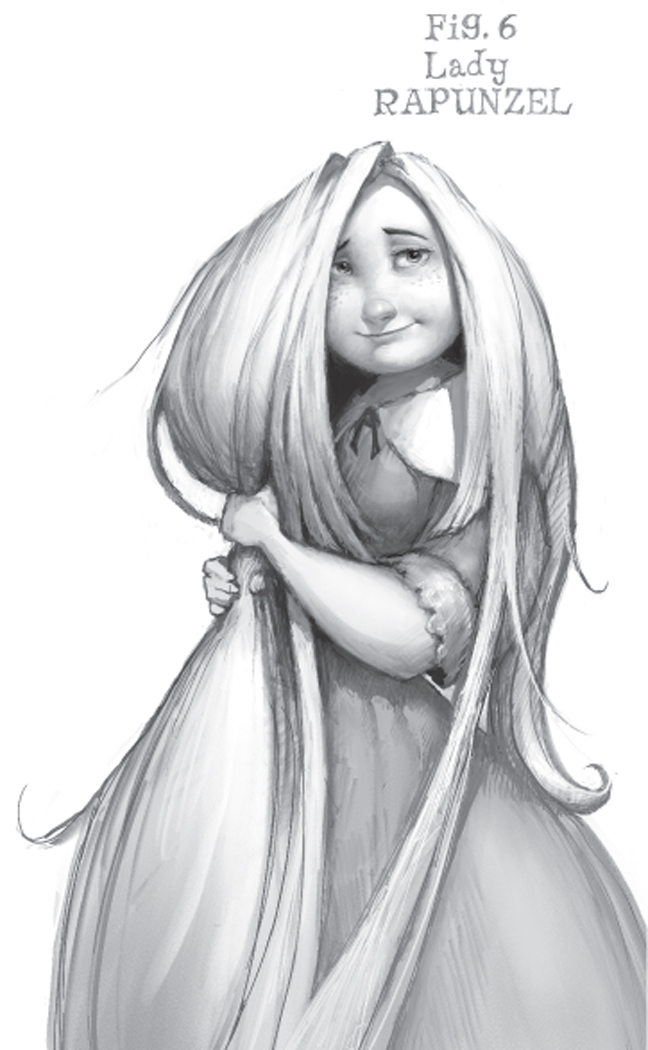
Under the darkening sky, he turned around and rode back to the tower. Rapunzel let down her hair for him but was confused to see Gustav reenter her prison room alone.
“Where are the others?” she asked.
“I need no others,” Gustav said with total confidence. “I will rescue you myself.”
“Did you get a ladder?” she asked hopefully.
“No,” he said, suddenly sounding less sure of himself.
“How are we going to get out then?”
Gustav had no plan, so he said nothing. He just peeked around in the corners of the room, pretending he was looking for something.
Moments later, a scratchy voice called from outside, “Rapunzel, let down your hair.”
“It’s Zaubera,” Rapunzel whispered. “Quick, you must hide.”
“I hide from no one,” Gustav said. “Let her up. When she steps into the room, I will kill the witch.”
“But—”
“Just do it,” Gustav insisted.
Rapunzel let down her hair.
When Lyrical Leif later chronicled the event in his song about Rapunzel, Prince Charming’s “battle” with the witch went on for three lengthy verses. In reality, it was over in less than three seconds. As soon as the witch stepped over the windowsill, Gustav leapt at her. The evil old woman caught him and, with superhuman strength, hurled him from the tower. Done and done.
Gustav’s landing was particularly nasty. He came down face-first into a painfully prickly briar patch. So painful, in fact, that the thorns scratched his eyes and blinded him. He spent the next several days stumbling through the forest, feeling his way from tree to tree. It was pitiful. After nearly a week, he collapsed from hunger.
Rapunzel, in the meantime, managed to get free (though how she pulled off that feat was a mystery to everyone but her and the witch). She searched the woods for Gustav, and eventually found him sightless and starving. Rapunzel cradled him in her arms and wept. And here’s the really amazing part: As soon as her tears hit Gustav’s eyes, his vision was restored.
Once the story got out—and boy, did the minstrels get a lot of requests for this one—Gustav’s brothers treated him worse than ever. He couldn’t show his face in the castle without hearing mocking calls like, “Look out, Prince Charming, I think I see a scary shrub! Don’t worry, we’ll call Cousin Helga to come save you!”
Gustav considered this the lowest point of his life. He’d become famous for being a failure. He’d never been much of a people person to begin with, and this only made things worse.
One day, after being jeered by a group of shepherds (according to Gustav, the sheep were laughing, too), the big prince retreated into the forest, climbed a tall tree, and sat among its highest branches, hoping to avoid human contact. Rapunzel found him anyway.
“Come down,” she called. “Come back home with me.”
“Go away,” Gustav said. “Can’t you see I’m in a tree?”
“I see how the words of others hurt you,” Rapunzel said. “But you’ll hear no harsh words from me.”
“Oh, that’s right—you’re Little Miss Perfect,” Gustav grumbled from up above. “It’s all your fault, you know. It’s because of you that everyone thinks I’m a joke.”
“I’m sorry you feel that way,” Rapunzel said, craning her neck to see him. “You know I only meant to help. When I saw you in that condition—”
“I would’ve been fine.”
“You were half-dead.”
“More like half-alive. See, that’s your problem, Mega-Braid. You’re always trying to fix something that doesn’t need fixing.”
“Fixing people is my gift.”
Gustav snorted. “Well, I’m returning it. Go re-gift it to someone else.”
Rapunzel was silent for a moment, then said, “I should. It’s selfish of me to keep this gift to myself. The world is full of people in need; I’m wasting my talents here, trying to give you reasons to like yourself.”
“What?” Gustav jumped down, breaking several branches on his way to the ground. “Why don’t you use your power on yourself, Miracle Girl? You’ve obviously got something wrong with your brain. ’Cause I like myself just fine. I love myself. What’s not to love? I’m a better fighter than anyone, a better hunter, a better horseman—”
“If you truly like yourself as you are, why do you feel the need to prove yourself better than everyone else?”
“Leave,” Gustav barked. “You said it: Go help someone else. I don’t need anybody.”
Rapunzel gathered her hair and began to walk away.
“You’re right,” she said as she left. “Helping others is what I was meant to do. I don’t understand you, Gustav. But maybe you do understand me, after all.”
He never told anyone that Rapunzel had left. But her departure only made Gustav more determined than ever to show the world he was a hero worthy of respect. He spent his days riding around the countryside, looking for someone to rescue.
Months later, on the outskirts of Sturmhagen, Rosilda Stiffenkrauss and her family were busily plucking beets from the ground, when the nearby trees parted with a rumble and a hulking troll stepped out of the forest, sniffing the air with its tremendous nose. If you’ve never seen one before, trolls are about nine feet tall, covered with shaggy, swamp-colored hair, and may or may not have horns (this troll had one crooked horn jutting out from the left side of its head). Many people, upon seeing a troll for the first time, think they are being attacked by a big, ferocious pile of spinach. Rosilda Stiffenkrauss, however, had lived in Sturmhagen her entire life and knew a troll when she saw one.
“Oh, for pete’s sake,” she sighed. “Here comes another one. Come on, kids; everybody inside until it goes away.”
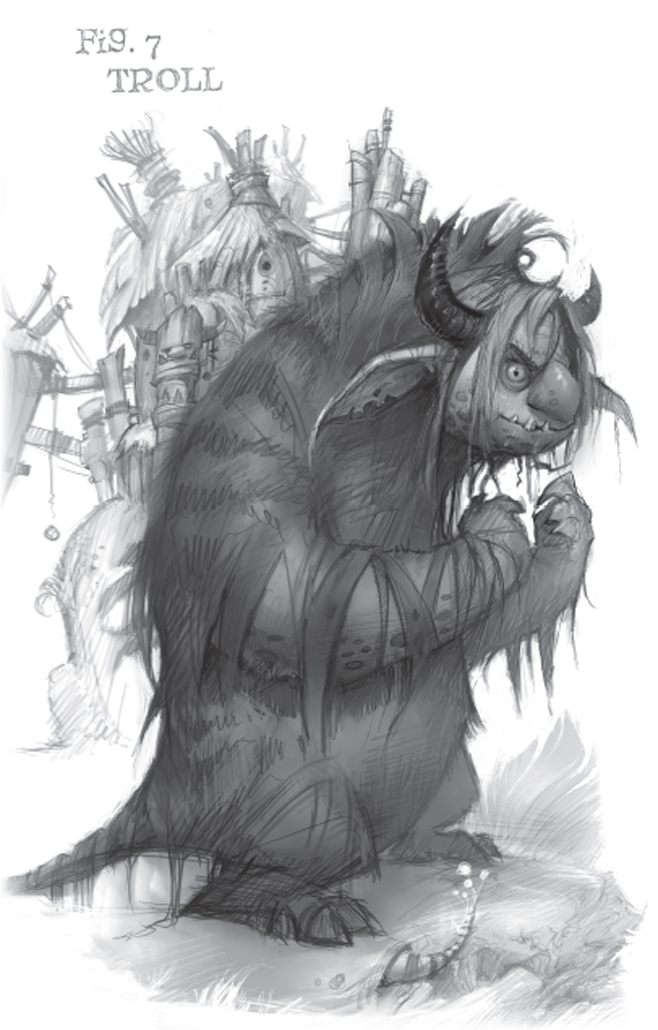
The big, greenish man-thing grunted and lumbered toward the farming family with a hungry smile on its hideous face. Rosilda quickly ushered her eleven children inside their small wood-frame house, where they all watched from the windows as the monster sat down amid their crops and started tossing handfuls of freshly picked beets into its mouth. Rosilda was furious.
“Stinking up the yard is one thing,” she spat, “but there’s no way I’m letting that beast devour our produce.”
The thickset, red-faced farmer woman wiped her hands on her apron, threw open the door, and marched back outside. “Get your grimy hands off our beets!” she yelled. Her wild and frizzy carrot-orange hair bounced with every angry word. “We spent the whole morning pulling those things up, and I’ll be darned if I’m going to let you gobble them all!”
Rosilda picked a shovel up off the ground and raised it over her head, threatening to clobber the vegetable thief, who was nearly twice her size. Her children crowded in the doorway and cheered her on. “Mom-my, Mom-my!”
The troll looked up at her in shock, as bright red beet juice ran down its chin. “Uh,” the thing grunted. “Shovel Lady hit?”
“You’re darn right I hit,” Rosilda growled back. “Unless you drop those veggies and head back into the woods you came from.”
The troll looked from the woman’s scowling face to the long, rusty shovel she waved menacingly overhead. It dropped the handful of beets it had been about to eat.
“Shovel Lady no hit Troll,” it mumbled as it stood up. “Troll make no trouble. Troll go.”
Enter Prince Gustav. Clad in clanking, fur-trimmed armor and wielding a large, shining battle-ax, he charged at the troll on horseback.
“Not so fast, beast!” Gustav shouted as he approached, his long blond hair flowing behind him. Without stopping his horse, he leapt from the saddle, turning himself into a human missile, and knocked the troll flat onto its back. The prince and the troll rolled through the garden in one clanking, grunting mass, smashing down freshly sprouted beet plants, until the creature finally got back to its feet and tossed Gustav off. The prince crashed through the wooden planks of the farmer’s fence but nimbly picked himself back up, ready to charge the monster again. That was when Gustav spotted the bright red beet juice around the troll’s mouth.
“Child eater!” he screamed. All the children were, of course, perfectly fine—and had actually filed back out into the yard to watch the fight—but Gustav was too focused on the monster to notice. The prince swung his ax. The troll caught the weapon in its large, clawed hands, yanked it away from Gustav, and tossed it off into a corner of the farmyard, where it shattered several barrels of pickled beets with a crunch and a splat.
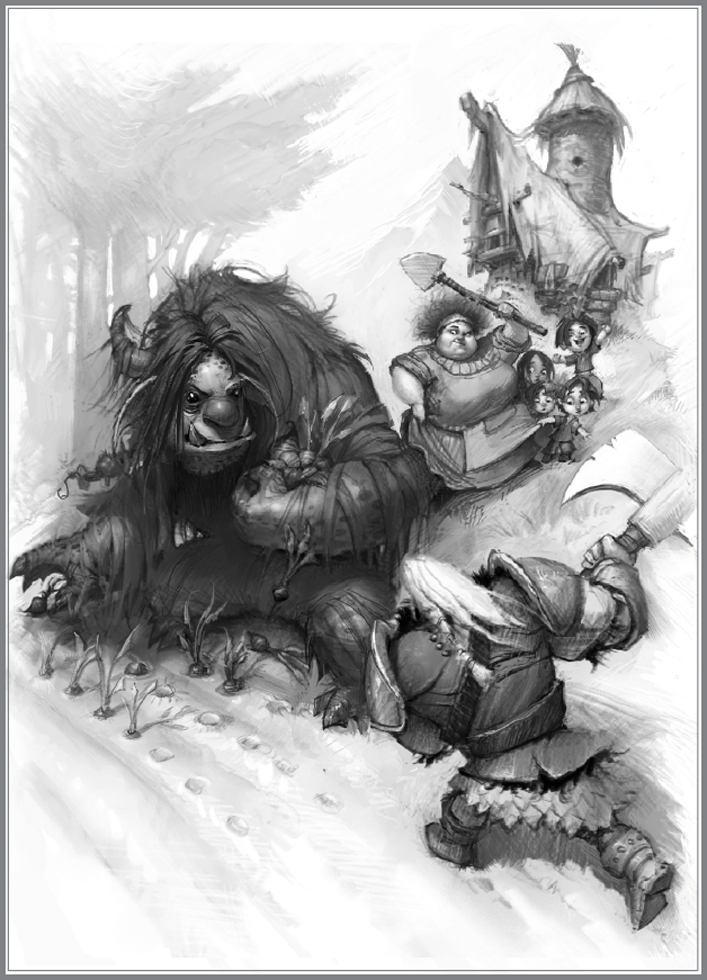
“Starf it all,” Gustav cursed (which prompted some of the older children to cover the ears of the younger ones).
Now unarmed, the prince stood face-to-face with the troll. The monster was nearly three feet taller than him, but Gustav showed no hint of fear. Gustav didn’t really do “fear.” Annoyance, consternation, occasionally embarrassment: Those were emotions Gustav was familiar with. But not fear.
“Why Angry Man do that?” the troll asked. Gustav charged at the creature, but it grabbed him in mid-run and lifted him into the air. The troll spun the prince upside down and rammed him headfirst into the ground with a pile-driver-like maneuver. Dazed, Gustav tried to crawl away, but the troll, still holding him by the feet, swung him to the left, smashing him through a stack of wooden crates. The monster then swung him back to the right, wrapping him around a fence post. Gustav swung his fist at the troll, but his punch didn’t even land. The creature hoisted him overhead and was ready to chuck him up onto the farmhouse roof, when Rosilda stepped up behind the troll and smacked it in the back of the head with her shovel.



